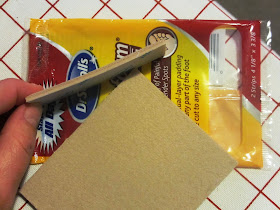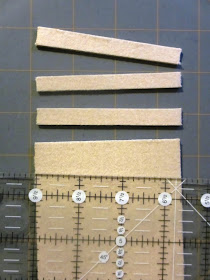things are really busy over here! After a great weekend it is time to get to work again - preparing for Quilter's Bloghop Party, teaching the machine applique class tonight, sewing other things...Tuesday's tutorial almost ran into Wednesday, ha ha!
But even though it is "right under the buzzer", lets conquer those accurate, and CONSISTENT 1/4" seams!
If you have been quilting for a while, you probably have your favorite way to do it - 1/4" foot? a line on your sewing machine to follow? When I started, I did buy one of those generic 1/4" foot, used it but found it not as easy always and a bit tiring...(constantly watching that fabric and edge of the foot) - all until I took one of my first classes with a national teacher, in Vermont Quilt Festival. It was Sharyn Craig and class was called Northwinds - great block, must show you sometimes!
But the main lesson for me, a fair beginner at the time, was her way of achieving a good, consistent 1/4" seam allowance - and in an easy way! This is what she used:
Yes - you saw it right, MOLESKIN! The one "normal" people (he he) use for their feet! :) Actually it is Dr. Scholl's MoleFOAM - Padding - very important distinction from Mole SKIN, which is much thinner. For this you need one that is thicker - here is how it looks:
Package comes with two sheets like this one shown, and you use onlu a small portion at the time, so one package will last you a long time. To use it, I take my rotary cutter and ruller and cut strips that are approximately 3/8" wide, like this"
Using rotary cutter to cut it gives a good, clean straight edge and that is important.
Once you have your strip - it is time to "install" it to the sewing machine - it has a sticky back, so it adheres nicely but it does not leave any residue or damage on the machine, so don't worry about that.
The goal here is to put this "guide" exactly 1/4" from your needle, or if aiming for a SCANT 1/4", you can do that too! Here is how:
1. Take one of your quilting rulers and find a FIRST 1/4" line from the RIGHT edge of the ruler: (pointed to in the photo)
2. Slide the ruler under the presser-foot and lower the needle right on that 1/4" line:
Here is the closer look of the needle lowered on the line - actually, if you look closely, needle is NEXT to the line, on its RIGHT side - that is how I position it if I want SCANT 1/4" seam allowance (which is what many patterns and sewing instructions call for)
If you want an EXACT 1/4" seam allowance, then position the needle EXACTLY ON the line, like this:
3. Once you have the needle in the right place, lower the presser-foot down on the ruler, so that is holds it in place:
4. Take one of the cut strips of Molefoam and peel-off the paper on the back to expose the sticky back:
5. Hold the ruler with your left hand, just so it doesn't move, and place the Molefoam strip SNUG against the ruler. Be careful not to place it UNDER the presser-foot (it will obstruct its work) but just as close to is as you can:Here is how it looks on the side:
6. Lift the presser-foot and needle, remove the ruler and you are now ready to sew:
7. When sewing, simply slide your fabric pieces right along that guide, making sure you are not pushing fabric over it or pulling it away from it - just slide it right along the guide!
And here is your nice, consistent 1/4" seam!So lets check it now! To check your seam, simply align the edge of the ruler with the edge of the sewn fabric and if you set it to be EXACT 1/4" seam, your stitching should be right UNDER that 1/4" line of the ruler, like this:
If you wanted a SCANT 1/4" seam, your stitching should be right NEXT to the 1/4" line of the ruler, like this:
So, what do you think? Does this make sense to you?
I really like using this kind of 1/4" guide, specially when doing strip-piecing and joining those 40" ;long strips. This gives me an easy to use guide, seam is nice and consistent and I don't have to strain my eyes constantly watching the edge of the 1/4" foot and fabric (as you have to do when using the 1/4" foot).
Also, this system allows me to do the SCANT 1/4' seam if I want to. This SCANT 1/4" stuff is sometimes confusing, specially for beginners. Why does one want to use it anyway? When making a block with many seams, the thickness of the thread will "eat-away" some of the block size, so using the scant 1/4" seam will accommodate that and ensure your block comes exactly the size it should be. If your block has only few seams (like 4-patch or Rail-fence), this is not a big issue and may not be needed.
Now, after showing you all this, I have to say that as this new 1/4" foot came out - I had to try that too! It is a 1/4" foot with A GUIDE:
It does work, and I do use it sometimes too, but if there isn't one for your machine or you simply don't want to buy yet another foot - good, old Dr. Scholl's Molefoam works really well! Just ask my Beginner's Quilting students - they all love it!
Let me know if you try it and how you like it and of course if you have any questions!
Off to catch some sleep now, wishing you a great Wednesday now (since Tuesday is all but gone! ha ha!)
Marija



















Thank you for tip. I'm going to get some of Dr. Scholl's MoleFOAM - Padding today!
ReplyDeleteThat's an amazingly simple solution! I do enough sewing on my machine that I can't always leave the 1/4" guide in place and they don't re-stick very well. This is a cost-effective solution as well. Thank you!!!
ReplyDeleteSounds like a really good idea, I will gladly try it. Thanks!
ReplyDeleteHey that sounds like a neat idea - next time I see it in the store - I'll pick some up and give it a try!
ReplyDeleteWOW! Received a new fancy machine as a gift, but the new feet are quite costly SO this is a GREAT TIP and a cost effective one as well. Thank you!
ReplyDeleteLove your tutorials for learning even if I think I am a seasoned quilter! Is the new foot you mentioned for a bernina?
ReplyDeleteKathy
Thank you for sharing this tip!
ReplyDeleteNever would have thought of that use for moleskin! Very clever. Thanks for sharing.
ReplyDeleteHi, Thanks for the tutorial. It seems like the best solution I have found.
ReplyDelete